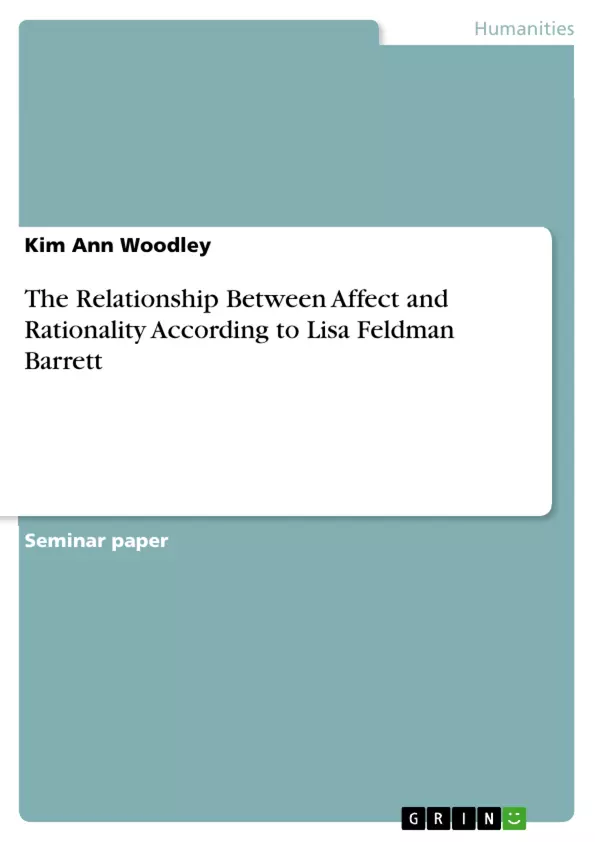The focus of this paper will lie on the relationship between affect and rationality, as described by Barrett. More specifically, I am going to discuss whether it is plausible to believe that affect subjugates rationality. My goal is to show that it indeed is credible to believe that there is necessarily a dependency between affect and rationality.
To argue for this, I will proceed as follows: First, I will give an overview on Barrett’s emotion-theory in chapter two. Then, I will concentrate on the term 'affect' in chapter three. I will dis-cuss what affect means, where Barrett places it in her theory and what consequences we (may) derive from it. For these two parts I will focus on the fourth chapter ("The Origin of Feeling") of her book "How Emotions Are Made" (2018) because she outlines the main idea of her proposal here. Accordingly, the first part of this paper is mainly reconstructive and about identifying the underlying beliefs that lead Barrett to her assumptions.
Outlining the consequences of affect will lead over to the critical approach to Barrett’s claims: In this step, I will explain why and how affect’s consequences connect to a person’s capability of rationality. To discuss the plausibility of the made assumptions I will attend to the model homo economicus in chapter four and five. Thereby I will focus on the definition(s) of rationality used in connection with this model and discuss the model in context with Barrett's theory.
I chose homo economicus because Barrett herself argues against it. I am also interested in examining homo economicus because I want to know whether Barrett is justified in rejecting the model. Finally, I will draw a conclusion based on the acquired information in this paper in chapter six. In this conclusion I will elaborate whether I was successful in arguing for the plausibility of a necessary dependency between affect and rationality.
Inhaltsverzeichnis (Table of Contents)
- Introduction
- Barrett's emotion theory: Interoception
- Affect, its role in interoception and its consequences
- Is affect an opponent of rationality?
- Does affect contribute to rationality?
- Conclusion
Zielsetzung und Themenschwerpunkte (Objectives and Key Themes)
The paper examines the relationship between affect and rationality as described by Lisa Feldman Barrett. It aims to show that there is a necessary dependency between affect and rationality, challenging the notion that affect subjugates rationality. The main objectives include exploring Barrett's emotion theory and its core concept of interoception, analyzing the role of affect in shaping perception and behavior, and discussing the potential consequences of affect on rationality.
- Barrett's emotion theory and the concept of interoception
- The nature of affect and its influence on perception and behavior
- The relationship between affect and rationality
- The model of homo economicus in relation to affect and rationality
- The potential for affect to contribute to rationality
Zusammenfassung der Kapitel (Chapter Summaries)
- Introduction: This chapter introduces the paper's topic, focusing on Lisa Feldman Barrett's theory of emotions and her concept of affect. It outlines the paper's argument that affect, as described by Barrett, is not an opponent of rationality but rather a necessary component. The chapter also presents the paper's structure and methodology.
- Barrett's emotion theory: Interoception: This chapter delves into Barrett's emotion theory, highlighting the concept of interoception as a key aspect. Interoception is described as a perpetual brain activity that involves predicting the body's internal state, influencing both bodily functions and interactions with the environment. It argues that predictions are based on prior experiences rather than solely on present sensory input.
- Affect, its role in interoception and its consequences: This chapter explores the concept of affect within Barrett's theory. Affect is described as a general sense of feeling that constantly influences perception, behavior, and thinking, regardless of conscious awareness. It also examines the consequences of affect, arguing that individuals' unawareness or misinterpretation of affect can lead to misleading perceptions of the world.
Schlüsselwörter (Keywords)
Key keywords include: affect, emotion, interoception, rationality, homo economicus, Lisa Feldman Barrett, brain, perception, behavior, prediction, experience, cognition.
Frequently Asked Questions
What is the relationship between affect and rationality according to Barrett?
Lisa Feldman Barrett argues that there is a necessary dependency between affect and rationality; affect is not an opponent but a fundamental component of rational thinking.
What is "interoception" in Barrett's emotion theory?
Interoception is the brain's perpetual process of predicting the body's internal state, which shapes how we perceive the world and react to it.
How does affect influence our daily behavior?
Affect is a constant "feeling" that influences our perception and decisions, often without us being consciously aware of its presence.
Why does Barrett reject the "homo economicus" model?
She argues against the idea of a purely rational actor, as human rationality cannot be separated from the underlying affective and interoceptive processes of the brain.
Can affect actually contribute to better rationality?
Yes, the paper discusses how affect provides necessary information for the brain to make "rational" predictions and navigate complex social environments.
- Arbeit zitieren
- Kim Ann Woodley (Autor:in), 2020, The Relationship Between Affect and Rationality According to Lisa Feldman Barrett, München, GRIN Verlag, https://www.grin.com/document/911127



